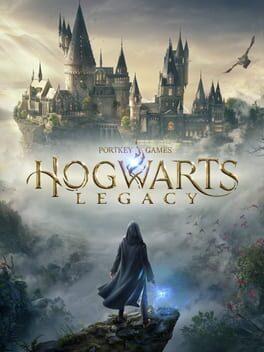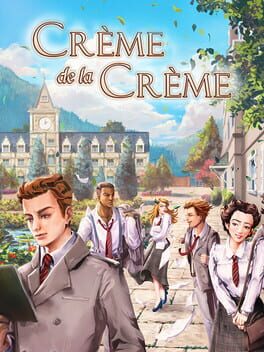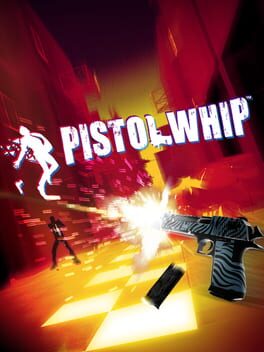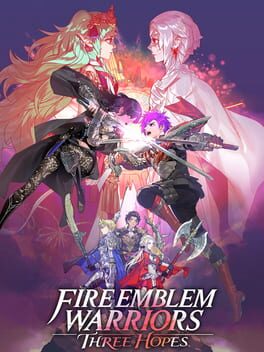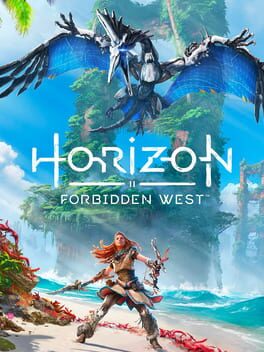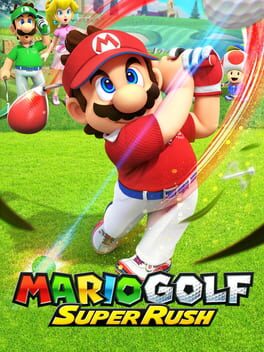Freedomfighter
8 reviews liked by Freedomfighter
Hogwarts Legacy
2023
That Potter game thing turns out to be a hell of a lot better than I expected it to be - that's down to a really good story, superb, flowing combat and above all, a meticulously crafted world which absolutely nails the look, atmosphere and feel of the franchise.
There's so many awesome little details thrown into this, from the countless codex entries scattered around Hogwarts Castle, Hogsmead village and the umpteen small hamlets dotted around the landscape. A lot of them will be familiar to fans of the series, many names (surnames at least) will have links to the main HP books, beasts you encounter have also been seen in the Fantastic Beasts films.
Gameplay is a mixture of attending lessons, undertaking 'assignments' from various teachers which in turn lead to learning many of the spells the game offers. These spells are useful in combat, in taming beasts, searching for hidden items, stealth sections, platforming puzzles. There's an impressive amount to learn, from transfiguring enemies into barrels during combat, freezing them after sneaking up on them using petrificus totalus, exploding walls with bombarda, moving people and objects with depulso, accio, descendo, levioso, wingardium leviosa etc etc. In fact, most of the spells familiar to fans of the series are here - including the unforgivable curses should you wish to learn them later in the game. You can select any 4 spells at one time, and you can switch between 4 of these skill sets. Swapping between spells is a bit cumbersome, I found myself equipping different spells depending on what bonus challenges were required for various battles (e.g. defeat 4 enemies with depulso, disarm 2 dark wizards with expelliarmus etc etc). Combat is far more complex than expected, and it's such tremendous fun - so much so that there are many sections I could have avoided by flying over them on my broom, but I sought them out to practise new combos between spells and because it's so damn fun.
There's a lot of Hogwarts Legacy that's been influenced by other open world titles but it never pretends to be original in that sense. There's an insane amount of things to collect, there are fairly simple environment based puzzle minigames called Merlin Trials, there are challenge arenas that throw waves of enemies at you, there's also the Room of Requirement which acts as a base room where you can grow plants, brew potions, house beasts, conjure furniture/furnishings etc etc. There might be some monotony here for anyone who doesn't enjoy such sections.
Aside from the excellent main story (I've seen lots of criticism of this and I simply have to disagree with these views - I thought it was really good) there are tons of side quests. These aren't that consistent. Some of them are brilliant but there are too many 'fetch quests' for my liking. Side quests involving some of your fellow students tend to be the best of them and act as sort of secondary campaigns - they're all well worth playing through.
One thing that is a bit annoying is the loot system, as you'll find the same pointless cosmetic items in chests across the whole of the map, and when inventory slots are stingy anyway, there's a constant need to organise your inventory, by discarding unwanted clothing items or finding a stall somewhere to sell stuff. It's a bit of a pain - rewards for finding a well hidden chest often aren't worth the effort you put in to find them.
I also don't think the charm and appeal of the game would be as strong without the HP license. It really is a superb use of the license, but like Jedi: Fallen Order is a good game made better with the Star Wars license, I think the same could be said of Hogwarts Legacy, albeit I think it's actually a better overall game than the EA one.
I really enjoyed playing this - I went through the whole thing with my Potter-obsessed 12 year old daughter, taking it in turns to do puzzles, combat sections etc and it never outstayed its welcome. It's a good, fun, open world adventure with tremendous combat and a really good, strong main storyline.
There's so many awesome little details thrown into this, from the countless codex entries scattered around Hogwarts Castle, Hogsmead village and the umpteen small hamlets dotted around the landscape. A lot of them will be familiar to fans of the series, many names (surnames at least) will have links to the main HP books, beasts you encounter have also been seen in the Fantastic Beasts films.
Gameplay is a mixture of attending lessons, undertaking 'assignments' from various teachers which in turn lead to learning many of the spells the game offers. These spells are useful in combat, in taming beasts, searching for hidden items, stealth sections, platforming puzzles. There's an impressive amount to learn, from transfiguring enemies into barrels during combat, freezing them after sneaking up on them using petrificus totalus, exploding walls with bombarda, moving people and objects with depulso, accio, descendo, levioso, wingardium leviosa etc etc. In fact, most of the spells familiar to fans of the series are here - including the unforgivable curses should you wish to learn them later in the game. You can select any 4 spells at one time, and you can switch between 4 of these skill sets. Swapping between spells is a bit cumbersome, I found myself equipping different spells depending on what bonus challenges were required for various battles (e.g. defeat 4 enemies with depulso, disarm 2 dark wizards with expelliarmus etc etc). Combat is far more complex than expected, and it's such tremendous fun - so much so that there are many sections I could have avoided by flying over them on my broom, but I sought them out to practise new combos between spells and because it's so damn fun.
There's a lot of Hogwarts Legacy that's been influenced by other open world titles but it never pretends to be original in that sense. There's an insane amount of things to collect, there are fairly simple environment based puzzle minigames called Merlin Trials, there are challenge arenas that throw waves of enemies at you, there's also the Room of Requirement which acts as a base room where you can grow plants, brew potions, house beasts, conjure furniture/furnishings etc etc. There might be some monotony here for anyone who doesn't enjoy such sections.
Aside from the excellent main story (I've seen lots of criticism of this and I simply have to disagree with these views - I thought it was really good) there are tons of side quests. These aren't that consistent. Some of them are brilliant but there are too many 'fetch quests' for my liking. Side quests involving some of your fellow students tend to be the best of them and act as sort of secondary campaigns - they're all well worth playing through.
One thing that is a bit annoying is the loot system, as you'll find the same pointless cosmetic items in chests across the whole of the map, and when inventory slots are stingy anyway, there's a constant need to organise your inventory, by discarding unwanted clothing items or finding a stall somewhere to sell stuff. It's a bit of a pain - rewards for finding a well hidden chest often aren't worth the effort you put in to find them.
I also don't think the charm and appeal of the game would be as strong without the HP license. It really is a superb use of the license, but like Jedi: Fallen Order is a good game made better with the Star Wars license, I think the same could be said of Hogwarts Legacy, albeit I think it's actually a better overall game than the EA one.
I really enjoyed playing this - I went through the whole thing with my Potter-obsessed 12 year old daughter, taking it in turns to do puzzles, combat sections etc and it never outstayed its welcome. It's a good, fun, open world adventure with tremendous combat and a really good, strong main storyline.
Hogwarts Legacy
2023
Creme de la Creme
2019
Pistol Whip
2019
Hellblade: Senua's Sacrifice intensifies the abnormalities surrounding psychosis through a visceral journey into the hellish underworld of Norse mythology, bravely blending a neurological deficiency with a dark fantastical hack-and-slash interactive experience.
WHAT I LIKED:
+ "The hardest battles are fought in the mind". Psychosis is the mental condition resulting in difficulties when determining what is reality and what is fantasy, such as suffering with delusions and hallucinations. Senua, a Celtic warrior, strives to travel to Helheim to rescue the soul of her dead lover from the Norse goddess of death Hela. Throughout her perilous journey, she becomes afflicted with a curse which conjures otherworldly enemies for Senua to combat and haunts her mind with the voices of darkness. Upon failure, the curse overwhelms her body and rots her flesh until she is no more. Ninja Theory's writer Antoniades, along with several neuroscientists and mental health specialists, sublimely supply a metaphor throughout Senua's Sacrifice that uniquely approaches the condition without forcing Senua to be a conduit for the condition. Through the use of backstory and heightened memories, Senua instantly becomes a fleshed out character without embodying the mental condition as a gimmick. She is not defined by the condition, rather the player experiences the turmoil with her. Subconsciously internalising the world to which she perceives it. It is, without a doubt, a masterful representation of a tricky mental condition to convey through art. To conceive a compelling narrative, build a melancholic world and raise awareness on psychosis, is nothing short of genius.
+ "A life without loss is one without love". Senua, captured in full motion capture by the talented Melina Juergens, is a performance to be reckoned with. The ferocity through the psychological horror. The tenacity through her unwavering determination. The fury buried deep with her, as she unleashes her anger out upon the world. It is breathtakingly intense. From the glares into the player's soul, to the vehement screams as she crumbles to the ground. For the entirety of her quest, Senua along with player will struggle to breathe. The inclusion of live action performances, reflecting her memories, and integral voice acting narration which act as verbal indications for the player, are purposefully designed to fit around Senua's condition. And it works, effortlessly.
+ "You destroyed everything! Everyone! But not me! Fight me now!". Blending a variety of genres, the core game mechanic ultimately relies on its hack-and-slash roots. Senua is provided with limited moves, such as a light/heavy attack and blocking capabilities. However the beauty of Senua's combat, despite its limitations, is how tight the controls are. Every slash of her sword and every dodge from oncoming enemy attacks felt instantly responsive, with a satisfying weight to them. The narrative is the key focus, therefore the combat's complexities are simplified to allow Hellblade to be as accessible as it can be, along with difficulty settings for the combat encounters.
+ In blindness, there can be wisdom; only by giving, can you receive in return". Along with the intense combat sequences and scenes of horrific nature, Senua has the ability to "focus" on runes and other visual distortions that correspond to the condition of psychosis. Elements and mechanics that are not visible for anyone else. These puzzling elements involve the player to use the environment to create runes, travel between a past and present world and mend broken shards to form a new path. Whilst not challenging, these moments allowed Hellblade to slow down the pace and breathe, building upon Senua as a character and the central narrative metaphor.
+ "Turn your back on death and you only see the shadow that it casts". Ninja Theory pulled one of the greatest implications in a linear game ever: permadeath. The correlation between erasing the player's save data if Senua dies too many times and the way fear is introduced to a person. The fact that this mechanic was a bluff all along proves how fear can be a catalyst for mental illness, and for many it kept them on their toes throughout the 4-5 hour game.
WHAT I DISLIKED:
- "This is the price she pays for seeing things differently". Hellblade is a work of art. It truly, truly is. A short intense gaming experience like no other. Yet, more often that not, the inconsistent pacing threw me off course. The blending of game mechanics was not as seamless as it could've been. The first act balancing the combat with the puzzle solving intuitively, as Senua faces two illusory trials. The second act, involving memory shards, was absent of combat and solely relied on puzzle solving. Then the conclusive third act, Senua approaching Helheim, focused on endless hordes of enemies to slay without incorporating any of the new puzzle mechanics that were previously introduced. From a gameplay perspective, Hellblade is too segregated and vastly ambitious with its ideas, that it cannot perfectly merge them all together in a cohesive way. Ultimately separating the supremely artistic narrative from the occasionally cumbersome core game.
VERDICT:
9/10 rune totems
WHAT I LIKED:
+ "The hardest battles are fought in the mind". Psychosis is the mental condition resulting in difficulties when determining what is reality and what is fantasy, such as suffering with delusions and hallucinations. Senua, a Celtic warrior, strives to travel to Helheim to rescue the soul of her dead lover from the Norse goddess of death Hela. Throughout her perilous journey, she becomes afflicted with a curse which conjures otherworldly enemies for Senua to combat and haunts her mind with the voices of darkness. Upon failure, the curse overwhelms her body and rots her flesh until she is no more. Ninja Theory's writer Antoniades, along with several neuroscientists and mental health specialists, sublimely supply a metaphor throughout Senua's Sacrifice that uniquely approaches the condition without forcing Senua to be a conduit for the condition. Through the use of backstory and heightened memories, Senua instantly becomes a fleshed out character without embodying the mental condition as a gimmick. She is not defined by the condition, rather the player experiences the turmoil with her. Subconsciously internalising the world to which she perceives it. It is, without a doubt, a masterful representation of a tricky mental condition to convey through art. To conceive a compelling narrative, build a melancholic world and raise awareness on psychosis, is nothing short of genius.
+ "A life without loss is one without love". Senua, captured in full motion capture by the talented Melina Juergens, is a performance to be reckoned with. The ferocity through the psychological horror. The tenacity through her unwavering determination. The fury buried deep with her, as she unleashes her anger out upon the world. It is breathtakingly intense. From the glares into the player's soul, to the vehement screams as she crumbles to the ground. For the entirety of her quest, Senua along with player will struggle to breathe. The inclusion of live action performances, reflecting her memories, and integral voice acting narration which act as verbal indications for the player, are purposefully designed to fit around Senua's condition. And it works, effortlessly.
+ "You destroyed everything! Everyone! But not me! Fight me now!". Blending a variety of genres, the core game mechanic ultimately relies on its hack-and-slash roots. Senua is provided with limited moves, such as a light/heavy attack and blocking capabilities. However the beauty of Senua's combat, despite its limitations, is how tight the controls are. Every slash of her sword and every dodge from oncoming enemy attacks felt instantly responsive, with a satisfying weight to them. The narrative is the key focus, therefore the combat's complexities are simplified to allow Hellblade to be as accessible as it can be, along with difficulty settings for the combat encounters.
+ In blindness, there can be wisdom; only by giving, can you receive in return". Along with the intense combat sequences and scenes of horrific nature, Senua has the ability to "focus" on runes and other visual distortions that correspond to the condition of psychosis. Elements and mechanics that are not visible for anyone else. These puzzling elements involve the player to use the environment to create runes, travel between a past and present world and mend broken shards to form a new path. Whilst not challenging, these moments allowed Hellblade to slow down the pace and breathe, building upon Senua as a character and the central narrative metaphor.
+ "Turn your back on death and you only see the shadow that it casts". Ninja Theory pulled one of the greatest implications in a linear game ever: permadeath. The correlation between erasing the player's save data if Senua dies too many times and the way fear is introduced to a person. The fact that this mechanic was a bluff all along proves how fear can be a catalyst for mental illness, and for many it kept them on their toes throughout the 4-5 hour game.
WHAT I DISLIKED:
- "This is the price she pays for seeing things differently". Hellblade is a work of art. It truly, truly is. A short intense gaming experience like no other. Yet, more often that not, the inconsistent pacing threw me off course. The blending of game mechanics was not as seamless as it could've been. The first act balancing the combat with the puzzle solving intuitively, as Senua faces two illusory trials. The second act, involving memory shards, was absent of combat and solely relied on puzzle solving. Then the conclusive third act, Senua approaching Helheim, focused on endless hordes of enemies to slay without incorporating any of the new puzzle mechanics that were previously introduced. From a gameplay perspective, Hellblade is too segregated and vastly ambitious with its ideas, that it cannot perfectly merge them all together in a cohesive way. Ultimately separating the supremely artistic narrative from the occasionally cumbersome core game.
VERDICT:
9/10 rune totems
this is probably the best 4/5 game i've written a review for on here. the production values are so damn high in this game, and are a big step up from the first game. the motion capture/performance in EVERY scene (not just major scenes) is really expressive, theatrical, and just expertly done overall. the density of the environments, and the diversity of environments, is unparalleled. it is really a showcase for technology in gaming.
the combat is obviously excellent - i played with Normal difficulty for damage received, and Hard difficulty for damage dealt, and it felt great. every enemy required a lot of strategy, and i was always using multiple weapon types and traps to overcome the enemies. knocking off parts/weapons off of enemies will always feel good.
the story i think offered a lot of promise, and peaked at around the 40% point of the game, but it never fully realized its potential by the end game. it wound up a bit overstuffed in terms of plot, antagonists, and sequel/DLC setup. the ending and its accompanying fight were lowlights of the story.
but that said, the main cast of characters is quite good - not S-tier necessarily (e.g. Mass Effect 2), but still A-tier. my highlights were Varl, Zo, Kotallo, and Alva.
this all sounds like a lot of praise, but i don't feel confident giving it a higher score because, aside from the combat, so much of this game's formula just feels a bit tired. although i didn't feel pressured to explore every checkmark/ get every collectible/ complete every side mission (my completion % at credits was just 55%), their mere presence in the design of the game robs a lot of discovery/ sense of adventure that is present in other open world games.
of course, i will still be buying and highly anticipating the next DLC/game!
the combat is obviously excellent - i played with Normal difficulty for damage received, and Hard difficulty for damage dealt, and it felt great. every enemy required a lot of strategy, and i was always using multiple weapon types and traps to overcome the enemies. knocking off parts/weapons off of enemies will always feel good.
the story i think offered a lot of promise, and peaked at around the 40% point of the game, but it never fully realized its potential by the end game. it wound up a bit overstuffed in terms of plot, antagonists, and sequel/DLC setup. the ending and its accompanying fight were lowlights of the story.
but that said, the main cast of characters is quite good - not S-tier necessarily (e.g. Mass Effect 2), but still A-tier. my highlights were Varl, Zo, Kotallo, and Alva.
this all sounds like a lot of praise, but i don't feel confident giving it a higher score because, aside from the combat, so much of this game's formula just feels a bit tired. although i didn't feel pressured to explore every checkmark/ get every collectible/ complete every side mission (my completion % at credits was just 55%), their mere presence in the design of the game robs a lot of discovery/ sense of adventure that is present in other open world games.
of course, i will still be buying and highly anticipating the next DLC/game!
I love video golf - NES Golf, Golden Tee, Toadstool tour, The Jack Nicklous series, Zany Golf (a mini-golf game on Amiga), and most recently Golf Story (I never got around to Beavis and Butthead: Bunghole in One, but apparently that's a thing). These games can provide a type of mesmerizing relaxation when played on their own, but the epitome of of the video golf experience is multiplayer (with the exception of Golf Story). It's thrilling when your opponent sets the parameters on their golf algorithm while you hope they screw up the timing. Your fate is sealed when they set the shot in motion, but you have to wait a beat to see what it will be. The release when they miss or make the shot is a rush, and entices you to play just one more hole. This scenario plays out every turn. After playing for just a few hours, there were more than a few emotional outbursts from me and my friends, both positive and negative. That's what I want from a Nintendo sports title, and this one delivers.
The game is crammed full of Mariosity to its benefit. The roster has most of the characters you'd expect to see (and some you probably don't!), complete with gaudy golf duds. Wario is an absolute Dad. Even King Bob-omb is here - a surprise to be sure, but a welcome one. The mechanics are sophisticated enough to keep things interesting. In addition to the basics - spin, curve, wind, terrain, environmental effects - each golfer has a special shot they can use to attack other golfers' balls. For example, when the special meter is full, Yoshi can eat their ball and spoot it out of their...backside...as a fresh egg down the fairway. When it lands, if other player's balls are in the splash zone, they're turned into eggs for the next shot. This makes them extremely cumbersome to aim, and makes putting neigh impossible. The pinch of chaos adds a pleasant amount of spice.
Although this one doesn't break any significant new ground, it's a solid iterative release with a tried-and-true formula. That's all I really wanted.
The game is crammed full of Mariosity to its benefit. The roster has most of the characters you'd expect to see (and some you probably don't!), complete with gaudy golf duds. Wario is an absolute Dad. Even King Bob-omb is here - a surprise to be sure, but a welcome one. The mechanics are sophisticated enough to keep things interesting. In addition to the basics - spin, curve, wind, terrain, environmental effects - each golfer has a special shot they can use to attack other golfers' balls. For example, when the special meter is full, Yoshi can eat their ball and spoot it out of their...backside...as a fresh egg down the fairway. When it lands, if other player's balls are in the splash zone, they're turned into eggs for the next shot. This makes them extremely cumbersome to aim, and makes putting neigh impossible. The pinch of chaos adds a pleasant amount of spice.
Although this one doesn't break any significant new ground, it's a solid iterative release with a tried-and-true formula. That's all I really wanted.
